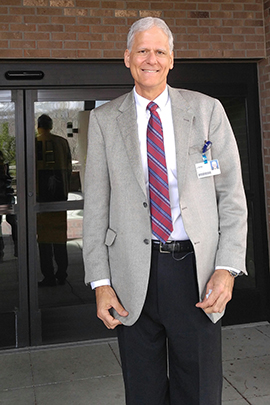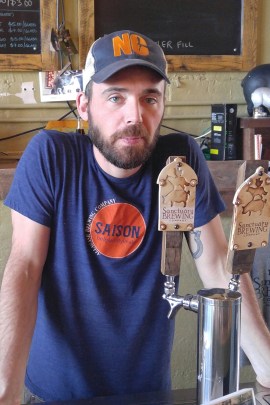HIGHLANDS, N.C. — In this corner of Appalachia, poverty takes a back seat to art galleries, country clubs, golf course communities, five-star restaurants and multimillion-dollar houses.
From this perch, Rep. Mark Meadows, a real estate entrepreneur who capitalized on the area’s transformation into a prosperous retirement and vacation community, rose to political power quickly. Now the conservative Republican leads the House Freedom Caucus, controlling between 30 and 40 votes in Congress and showing few qualms about endangering his party’s best chance to repeal the Affordable Care Act.
“I am willing to invest the political capital to get it right,” Meadows, who has called the GOP replacement “Obamacare Lite,” said Thursday on MSNBC. “The next week is critical.”
And on Saturday, Meadows went to President Donald Trump’s Mar-a-Lago Club in Florida to negotiate over the bill with Trump aides, along with with Sen. Ted Cruz (R-Texas) and Sen. Mike Lee (R-Utah).
Meadows’ confidence is warranted.
His gerrymandered district covers 17 counties, spanning 150 miles across western North Carolina. The populous liberal bastion of Asheville is mostly carved out of his district like a bite from a cookie. What’s left is a retiree-rich constituency of 750,000 people that is heavily Republican, mostly white and lives mainly in small, rural towns amid pockets of extreme wealth. Its survival could hinge on a Supreme Court ruling expected this year in a case alleging racial bias in the state Legislature’s 2011 redrawing of North Carolina’s congressional map.
Elected in 2012, Meadows, 57, has rebelled against the establishment Republican Party — helping shut down the government in 2013 and ousting Speaker John Boehner in 2015.
While Democrats and even moderate Republicans decry House Speaker Paul Ryan for cutting federal aid to help get people insured in the GOP bill, Meadows says the cuts don’t go deep enough. He vows to oppose any ACA replacement that does not bring down health costs for people and government. No such plan that actually controls costs is on the table, however.
Meadows wants to cut off all 10 million Americans who today get federal subsidies to buy health coverage, which he says the country can ill afford. With enough support, Meadows could either block the House leadership from passing its plan or force it to approve a more conservative replacement that would face little chance of getting through the more moderate Senate.
Meadows’ potential role as “Trumpcare” spoiler — is stirring concern in the White House and Congress. By Thursday, Meadows seemed to have gotten that message.
“The last thing I want is for the president to be mad at me,” Meadows told Politico. “He asked me to negotiate in good faith, so I have been working around the clock.”

A lake in Highlands, N.C., is pictured. (Phil Galewitz/KHN)
Meadows was absent, though, from a Friday meeting in the Oval Office with members of the Republican Study Committee, another group of conservative representatives, where Trump said he had secured enough votes to pass the House bill.
Meadows’ hard line doesn’t bother most folks back in western North Carolina, where Obamacare is unpopular. Only about 5 percent of those in his district receive government-subsidized health plans made available by the law.
Meadows, who now lives in West Asheville, moved to North Carolina from Tampa to raise a family in the 1980s. The proprietor of a small sandwich shop here in Highlands before he shifted to real estate, Meadows is revered by his constituents.
Even the local hospital industry — which typically opposes any effort to scale back the health law — remains firmly in Meadow’s corner.
“We are big fans of Mark. He’s a man of integrity and he has the heart,” said Jimm Bunch, CEO of Park Ridge Health, a 103-bed hospital in Hendersonville, N.C. He heaps praise on Meadows even as the congressman fights to eviscerate the law that helped the hospital achieve one of its best financial years ever. As more patients got insurance, Park Ridge gained $600,000 a year in funding it used to provide free care to other patients.

Jimm Bunch, CEO of Park Ridge Hospital in Fletcher, N.C. says the hospital made more money as a result of Obamacare subsidies but won’t bash the Meadows plan to take them away. (Phil Galewitz/KHN)
Because North Carolina did not expand Medicaid under Obamacare, many poor adults remained uninsured. The state’s uninsured rate fell from 20.4 percent in 2013 to 13.6 percent in 2016, 2.5 points higher than the national average, according to Gallup.
Small-business owners, who provide most jobs in the district, are reluctant to take on Meadows., who is seeking to eliminate their government assistance to get health coverage.
At Sanctuary Brewing in Hendersonville, co-owner Joe Dinan said the Obamacare coverage he bought this year helped him get skin cancer surgery on his head. “I don’t want to see the subsidy end,” Dinan said. He won’t say anything critical about Meadows though, demurring that Hendersonville is a small town.
Meadows insists no one will get left behind.
He wants to allow people to buy less-expensive policies with fewer benefits than now required under the ACA. His tax help would be in the form of deductions people take at the end of the year or a break on their payroll taxes — different than both the current law and the Trumpcare plan working its way through Congress now.
It worries Rachel Lewicki, 30, who works at the local tea and spice shop on Main Street in Highlands.
Lewicki recently had surgery for a uterine tumor, paid for by a subsidized health plan she bought under Obamacare that costs her less than $100 a month. Now she fears her good fortune will end. “It’s not fair,” she said. “The way things are going, I’m scared and so are a lot of people who need this help.”
Kent Loy, a volunteer at a thrift store in Hendersonville, speaks of Meadows in harsher, personal terms.
“It’s an attack on the poor and how someone who claims to be a Christian can take this behavior is beyond me,” said Loy, 71. “This should disqualify him from office.”

Joe Dinan, co-owner of Sanctuary Brewing in Hendersonville, used Obamacare subsidies to get coverage and deal with skin cancer this year. (Phil Galewitz/KHN)
But it won’t, said Chris Cooper, professor of political science at Western Carolina University. Meadows has little to worry about in his heavily Republican district where he took 65 percent of the vote in November. “Taking out Asheville turned the district from being the most competitive district in the state to the most conservative,” Cooper said.
The political climate is challenging for cultivating grass-roots opposition, according to Susan Kimball, of Waynesville, N.C., who is part of Progressive Nation WNC, a group pushing to retain the ACA.
She said she has sought to meet Meadows in his district office several times to complain about his Obamacare stance, but to no avail.
Critics like her have recently pushed Meadows to hold a town hall meeting to hear their views, as many members of Congress did in the past month. His office said Meadows arranges such meetings only in August.
“I just feel like he doesn’t care,” Kimball said.
A cancer survivor, Kimball, 62, has benefited from Obamacare’s mandate that insurers provide coverage to people with preexisting health conditions. For $237 a month, Kimball has a subsidized Blue Cross plan that pays for visits to doctors and tests when she needs them.
She moved to Waynesville from South Florida four years ago, and the area’s conservatism has been an eye-opener.
“We were just moving to the mountains, and we didn’t know the region would become Tea Party central,” Kimball said.



